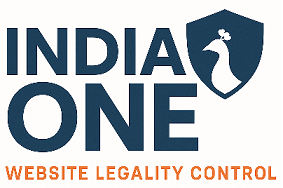Welcome to India One Website Legality Control
Recognizing the growing influence of digital platforms on society and the urgent need to protect the Indian public from harmful, illegal, and unethical online content, we, the founding members, hereby establish the non-governmental organization "India One" to monitor, report, and raise awareness about internet websites operating within or targeting the Indian market.
The internet is a powerful tool for knowledge, connection, and progress. However, it is increasingly threatened by misinformation, harmful content, and cyber threats that undermine trust and safety. At India One Website Legality Control, we are committed to fostering a safer, more transparent, and inclusive digital environment for all Indians.
Article I: Name and Legal Status
- The name of the organization shall be "India One".
- "India One" is a non-profit, non-governmental organization (NGO) established under applicable Indian law.
- The organization is non-political and operates independently of any governmental, religious, or commercial influence.
Article II: Mission and Objectives
Mission:
To protect Indian users from illegal, harmful, and unethical online content by promoting transparency, accountability, and responsible digital practices.
Also, our mission is to promote a clean and responsible internet ecosystem in India by advocating for robust policies, raising public awareness, and empowering citizens with the tools and knowledge to navigate the digital world safely. We work with stakeholders across government, civil society, and the private sector to address challenges such as online misinformation, data privacy violations, and harmful content, ensuring the internet remains a force for good.
Objectives:
- To monitor websites operating in or targeting the Indian market for illegal, fraudulent, or harmful content.
- To create reports and databases of websites that violate Indian laws or social norms.
- To collaborate with government bodies, civil society, and digital platforms to take down or restrict access to such websites.
- To raise public awareness about digital threats, including scams, misinformation, cyberbullying, and exploitation.
- To advocate for stronger regulations and ethical standards for online content and platform accountability.
- To support victims of online harm through guidance, education, and legal resources.
Article III: Scope of Work
- Monitoring of websites, apps, and platforms operating within or targeting the Indian audience.
- Collection and analysis of data on online content that may be considered illegal, abusive, misleading, or damaging to individuals and society.
- Reporting such content to relevant authorities, media, and the general public.
- Organising educational campaigns, workshops, and forums to promote digital literacy and safety.
- Collaborating with local and international partners to uphold global standards of internet ethics.
Article IV: Structure and Governance
- General Assembly - The highest decision-making body, composed of all members.
- Board of Directors - Elected by the General Assembly to provide strategic direction and oversight.
- Executive Committee - Responsible for day-to-day operations, led by the Executive Director.
- Advisory Board - Composed of legal, technical, and academic experts guiding on complex issues.
- Special Task Forces - Established to investigate and respond to emerging threats in specific sectors (e.g., gambling, child safety, misinformation).
Article V: Membership
- Membership is open to individuals and organizations committed to the mission of “India One.”
- Members must adhere to the organization’s code of ethics and support its activities.
- Membership categories may include: Founding Members, Active Members, Advisory Members, and Honorary Members.
Article VI: Funding and Resources
- “India One” is funded through grants, donations, membership fees, and partnerships.
- The organization shall not accept funding from entities whose activities conflict with its mission.
- Complete financial transparency and annual reporting are mandatory.
Article VII: Transparency and Accountability
- All operations, findings, and financial activities shall be documented and made publicly accessible.
- Annual impact reports shall be published detailing achievements, challenges, and financial audits.
- The organization shall uphold the highest standards of data privacy, impartiality, and ethics.
Article VIII: Amendments
- A two-thirds vote of the General Assembly may amend this Charter.
- Proposed amendments must be circulated to members at least 30 days before the meeting.
Article IX: Dissolution
- A three-fourths vote of the General Assembly may dissolve the organization.
- Upon dissolution, all remaining assets shall be transferred to a non-profit organization with similar goals and mission.
India’s digital landscape is vibrant and diverse, with over 800 million internet users and growing. However, this growth comes with challenges. From fake news that disrupts social harmony to cybercrimes that threaten financial security, the need for a cleaner internet has never been greater. India One Website Legality Control is dedicated to addressing these issues through research, policy recommendations, and community-driven initiatives.
We believe every Indian has a role to play in building a safer internet. Whether you are a student, professional, or concerned citizen, you can contribute by staying informed, reporting harmful content, and supporting ethical digital practices. Together, we can create an internet that reflects the values of trust, respect, and responsibility.
